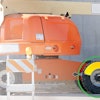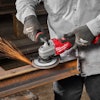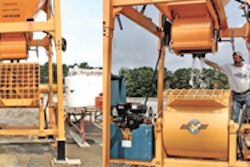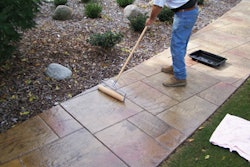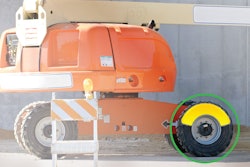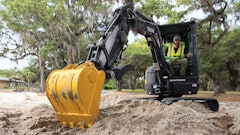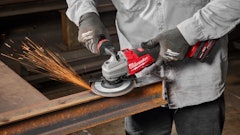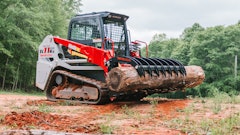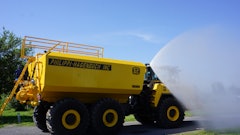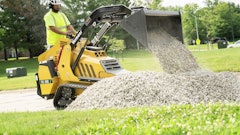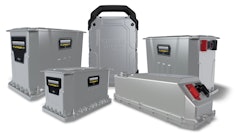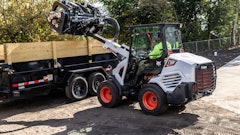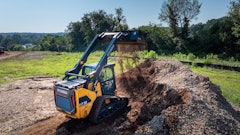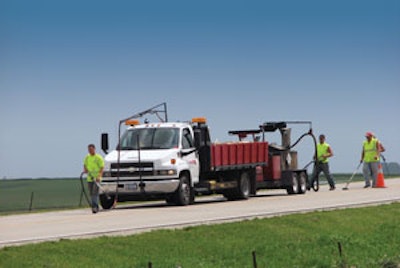
Brad Bargen grew up in the construction industry, and when he started his own company in 1981 he had a goal. "I told my wife that someday I'd like to be respected in this industry by all the companies we do business with," he says. "And today we are. We work with some of the biggest and best pavers in the area."
No small feat considering Bargen Inc., Mountain Lake, MN, does much of the prep work, primarily cracksealing and patching, before pavers even get to the job. In fact, Bargen could be considered primarily a cracksealing contractor as almost 40% of its revenues are generated from the asphalt maintenance division. But as Bargen, president (and also half-owner of Midstates Equipment Supply) explains, the contractor offers a full slate of paving and pavement maintenance repair options, which makes it a valuable contractor to do business with.
Started as Bargen Roofing and Asphalt Sealing in 1981, Bargen Inc. currently employs about 60 people in three divisions: Asphalt Maintenance, Commercial Roofing, and General Construction. The Construction Division operates independently of the rest of the company with about 10 employees and its own equipment, all managed by Bargen's brother Bryan. The other two divisions employ near 50 people at peak season, including six full-time salespeople who cross-sell for both the pavement maintenance and roofing divisions (and who also sell for Midstates Equipment Supply), and a four-person full-time office staff.
Cracksealing leads the way
The Asphalt Maintenance Division includes two highway crews that do primarily cracksealing, one parking lot crew that does cracksealing and sealcoating, one striping crew, and two patching crews that do both infrared and cutout patches. Asphalt maintenance crews perform some residential work but primarily work on parking lots and roads.
One highway crew works for between 80 and 100 municipalities a year; the other highway crew focuses on county roads and airports. Bargen covers all of Minnesota, eastern North Dakota and South Dakota all the way to the Canadian border, and Iowa. Bargen says that all in all the Asphalt Maintenance Division completes about 500 jobs a year, making scheduling "somewhat of a nightmare." He and Michelle Quintero work together to schedule the work, grouping the jobs geograpically. Work is not scheduled based on the type of customer (public or private) or tye type of service needed.
Almost half of Bargen's work involves crack repair, which the contractor did in traditional ways using traditional technology. But two years ago Bargen switched from the traditional block of material, boxed in cardboard that had to be removed before placing the block in a melter, to Maxwell Nuvo, which is a self-contained block that can be placed in the melter, container and all.
Bargen says the manufacturer cut back on the polymer contained in the cracksealing material itself, using that same amount of polymer in the "box" the block of materials comes in. "When you throw the entire box into the melter the 'box' melts and the proper amount of polymer is melted into the material," Bargen says.
He says this new approach to material is safer for employees, who no longer have to shake the material out of the box, and its also saves on man hours because the contractor is not paying a laborer to cut the boxes open, stack up the blocks, and flatten and stack the empty cardboard.
"I think you can eliminate one man on the crew, or you keep that man out there and increase your productivity," Bargen says. "We've kept that guy to increase production."
Creating repeat customers
If Bargen had one overriding reason for success it would likely be the contractor's efforts at retaining customers. Other factors - job quality, productivity, attention to detail, making the proper problem-solving recommendation to clients, and taking care of its employees - all contribute. But all of those elements work together to generate repeat customers.
"We're not the cheapest company out there," Bargen says. "We're known for our quality, our service, and we stand behind our work. We have good repeat clientele and because of that we're able to negotiate 80% to 85% of our work each year."
"We emphasize to the crews that it takes hours and years to find a customer and only minutes to lose him," Bargen says. "We tell our crews that it's a lot easier to find repeat work than it is to find new customers every year, and they understand that and approach their work accordingly."
Provide sound advice
Bargen says its estimators and salespeople make every effort to provide its customers with good advice. Bargen says this focus on providing sound advice is manifested in its sales training, where estimators are trained to sell but first trained to solve problems. "We don't sell to make a quick buck today," he says. "If it isn't in the best interests of the customer then don't sell it. That's how we approach it and how we expect our salesmen to approach it.
"We give knowledgeable recommendations," he says. "Our belief is that materials don't fail, recommendations fail. I've yet to see material fail; it's the material in the wrong use that fails. If it shouldn't be used then we need to be recommending something else, whether we do it or not."
That includes recommending work Bargen's crews don't do - if that's what the customer's pavement needs.
"We've got plenty of companies around here that do very good work and because of our association with them we can get that good work done for our customers - even though it isn't work we do ourselves."
4-day work week
Many of Bargen's crews are on the road for long stretches on big state or county jobs. So Bargen has adjusted its schedule, going from five-day work weeks to four-day weeks.
"It's pretty clear that four longer days is more economical than five days," he says. "Because we send crews away we use a lot of hotels, and that costs us money. This approach saves us an extra night of hotel costs." He says a four-day week also saves on fuel costs. But whether on the road or working out of the Mountain Lake location, Bargen's crews seldom work weekends - 95% of their work is Monday through Thursday - though they will work Saturdays if pressed. "We're trying to be family oriented because that's how we'd like it if we were our employees, and that approach helps us keep employees."
Bargen says he knows a lot of contractors work their crews six or even seven days a week throughout the summer. "But they have very high turnover," Bargen says. "Some of our people have been here 15 to 20 years and we think our schedule is one reason why."

